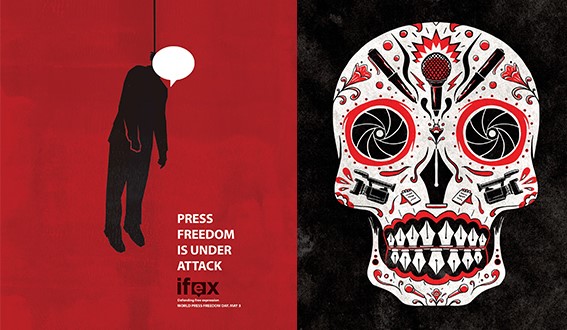Image of the poster courtesy of IFEX.
“We call upon you to revoke the said directive and use existing legal provisions to deal with any action that would constitute an offence, such as threatening state officials. In particular, we urge you to take action to the fullest extent of the law against those engaging in inciting ‘hatred that constitutes incitement to discrimination, hostility or violence’ against certain religious and ethnic communities, and blames them for increasing the spread of COVID, thereby making them vulnerable to threats, intimidation and violence.” says a joint statement by civil society groups in relation to the Notice Issued by the Police Media Division on 1st April.
The letter address to the C.D. Wickremaratne, Acting Inspector General of Police follows:
C.D. Wickremaratne
Acting Inspector General of Police
Police Headquarters
Colombo 1.
CC: Kamal Gunaratne, Secretary, Ministry of Defence
Chairperson, National Police Commission
Chairperson, Human Rights Commission of Sri Lanka
Re: Notice Issued by the Police Media Division
On 1 April 2020 the Media Division of the Sri Lanka Police, upon the instructions of the Acting Inspector General of Police (IGP), issued a notice addressed to all media organizations that strict legal action will be taken against those who spread/share false or malicious messages, news or information.
The notice that strict action will be taken against those who ‘criticize’, point out ‘minor shortcomings/failures’ or ‘scold/chastise’ state officials performing their duties, adversely impacts on the freedom of expression, in particular the expression of dissent. This constitutionally guaranteed freedom is key to holding the state to account for its actions, and questioning the action or inaction of state officials is the civic duty of every citizen, and is fundamental to ensuring a healthy and functioning democracy. Hence, it should not be interpreted as obstructing the performance of the duties of public officials.
We recognize the need to counter the circulation of false or malicious information, and to take action against those that hinder public officials from performing their duties or threaten them. However, the notice treats criticism of state officials as amounting to obstruction of their duties and spreading disinformation. This notice amounts to an unreasonable wielding of state power, and interferes with the civic duty to call the state and its agents to account. This curtailing of freedom and abuse of power cannot be justified and plays no role in dealing with the pandemic.
Preventing the spread of COVID-19 requires transparency and the provision of timely and easily accessible information to the public to create public confidence in the state. Punitive and repressive measures that shrink the space for criticism and prevent the public from raising real concerns and holding state officials to account will in fact have the opposite result. It will instead create fear, panic and public anxiety. It also creates opportunity for mischief, and the politically motivated abuse of state power and authority.
Moreover, there is no provision in law that authorizes the arrest of those ‘criticizing’ the state. Hence, we are deeply perturbed by your instructions to the DIG of CID and all island OICs to ‘strictly use the law’ against such persons, to arrest them, produce them in court, and to take further legal action, as it could constitute extra-legal action that results in arbitrary arrest and detention.
We call upon you to revoke the said directive and use existing legal provisions to deal with any action that would constitute an offence, such as threatening state officials. In particular, we urge you to take action to the fullest extent of the law against those engaging in inciting ‘hatred that constitutes incitement to discrimination, hostility or violence’ against certain religious and ethnic communities, and blames them for increasing the spread of COVID, thereby making them vulnerable to threats, intimidation and violence.
1. Angelica Chandrasekeran
2. Anushaya Collure
3. Shalomi Daniel
4. Marisa De Silva
5. Sr. Nichola Emmanuel
6. Rev. Fr. Reid Shelton Fernando
7. Ruki Fernando
8. Rev. Fr. Terence Fernando
9. Anne-Marie Fonseka
10. Bhavani Fonseka, Centre for Policy Alternatives
11. Mike Gabriel
12. Mario Gomez
13. Shymala Gomez
14. Gehan Goonetileke
15. B. Gowthaman
16. Dr. Annahl Anbini Hoole
17. Prof. Dushyanthi Hoole
18. Elilini Hoole
19. Dr. Rajan Hoole
20. Prof. S. Ratnjeevan H. Hoole
21. Yovahn Y.R. Hoole
22. Ruwan Laknath Jayakody
23. Dr. Sepali Kottegoda, Women and Media Collective
24. Rev. Fr. Nandana Manatunga
25. Mahesh de Mel
26. Rev. Saman Perera
27. Muthulingam Periyasamy
28. Prabodha Rathnayaka AAL
29. Yamini Ravindran
30. Thyagi Ruwanpathirana
31. Dr. Athulasiri Kumara Samarakoon
32. Kumudini Samuel, Women and Media Collective
33. Dr. Paikiasothy Saravanamuttu, Centre for Policy Alternatives
34. Shreen Saroor
35. Ambika Satkunanathan
36. Rev. Fr. Rohan Silva, CSR
37. Ermiza Tegal
38. Sushmitha Thayanandan
39. Sirany Thevakumar, Rights activist
40. Sandun Thudugala, Activist
41. Deanne Uyangoda
42. Senel Wanniarachchi
43. Thiyagaraja Waradas
44. Dimantha Weliange
45. Subha Wijesiriwardene
46. Deshamanya Godfrey Yogarajah
Organizations
1. Adayaalam Centre for Policy Research
2. Centre for Policy Alternatives
3. Human Rights Office, Kandy
4. INFORM Human Rights Documentation Centre
5. International Centre for Ethnic Studies
6. Right to Life Human Rights Centre
7. Rights Now – Collective for Democracy
8. Women’s Action Network
9. Women and Media Collective
